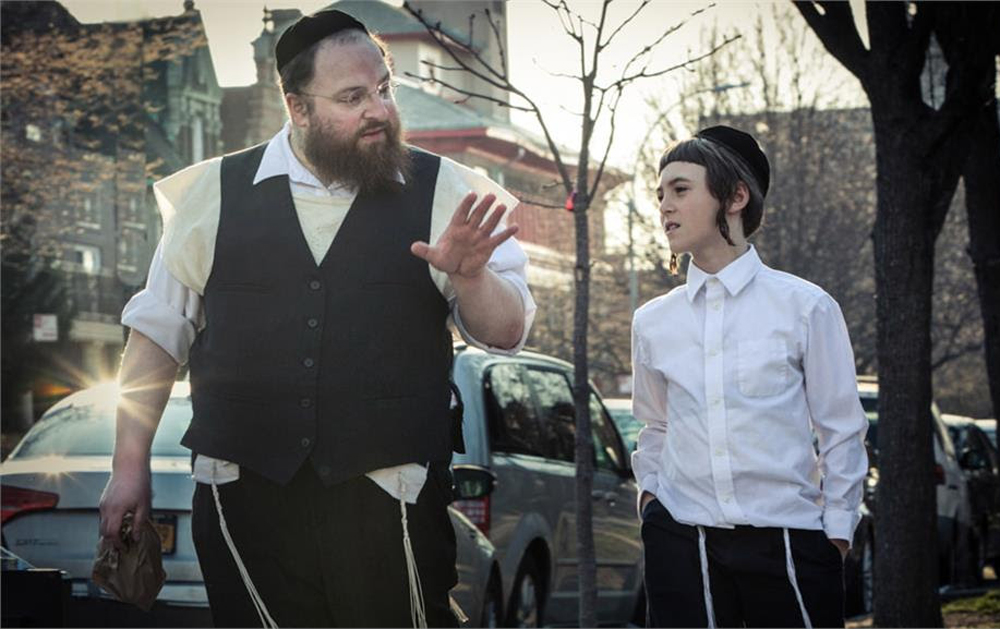It’s appropriate that despite having his name in the title, the first person you see in “Menashe” is not who you come to follow in Joshua Z Weinstein’s debut feature set amidst the Hasidic community of New York, instead observing at first one young man who arrives in the center of the frame with cell phone in hand and his hair braided in the form of a payot, the uneasy juxtaposition of old culture with the new that exists in the Yiddish-speaking section of the city. Eventually, Menashe shows up – you learn soon he’s known for running late – and seizes the central focus, but the point has been made that it’s on his shoulders to hold on to it as the constant threat looms that he will be marginalized and the community will swallow him whole.
Then it’s a good thing that Weinstein and Menashe Lustig, the man playing the eponymous role, make Menashe as intriguing a figure as they do, intricately laying the groundwork for a compelling character study at a turning point in the orthodox Jew’s life. Involving a significant portion of the same creative team that previously enmeshed audiences in the Somali community of Minneapolis in last year’s “A Stray,” directed by Musa Syeed (a co-writer here), “Menashe” strives for the same level of immersion, if not more so in demonstrating how custom has turned to alienation for its lead character, who recently lost his wife Leah and was forced to give up his son Rieven to her brother and his wife until he can remarry since a two-parent home is required by their religion to raise a child. Menashe, who isn’t exactly enamored by the rituals of his faith in the first place – he wasn’t the marrying type in the first place, so a second set of nuptials isn’t welcome – eventually pulls Rieven back into his care, to the umbrage of the family’s rabbi, who rules that the two can stay together until Leah is laid to rest in a week’s time.
“Menashe” never really shifts into another gear dramatically from there, but Weinstein is wise enough to trust that he and co-writers Musa Syeed and Alex Lipschultz created a scenario rife with intrigue since all sides are justified in their desire for Rieven’s custody. While Menashe clearly cares for the boy, taking care of him full-time is another matter since he struggles to make ends meet with his job at a local market with an unforgiving boss and his impetuous nature, prone to doing what feels good at the time without considering the consequences as well as giving him a short temper, make him a less responsible parent than his brother-in-law and his wife would be. Still, even as others call him a schlimazel, it’s all but impossible to root against him as he relates to his son more than anyone else, perhaps since he too hasn’t quite left boyhood behind, and makes a great effort to keep him, even trying his hand as a kitchen novice at making kugel in a bid to impress the community at his wife’s wake.
The cherubic Lustig is winning in the lead role, providing a great deal of the film’s charm, but equally important is the depth of detail injected into every frame in depicting life in the Hasidic community with cinematographer Yoni Brook’s camera always feeling as if it’s snuck into a sacred space. The film captures both the strong convictions of those of the ultra-Orthodox faith in both celebration and the rules that their community is governed by, as well as all they have given up to abide their religion. That Menashe becomes a square peg, unsure of whether such a lifestyle is even for him after years of observation, gives those who might be similarly skeptical a way into understanding the culture while showing great respect for it. In that sense, Weinstein walks a tightrope similar to the one of his main character, and though Menashe may occasionally falter, this director impressively does not in his first feature.
“Menashe” does not yet have U.S. distribution. It will play four more times at the Sundance Film Festival on January 24th at noon at the Library Center Theatre in Park City, January 25th at 6:45 pm at the Broadway Centre Cinema in Salt Lake City, January 26th at 12:15 pm at the Temple Theater in Park City, and January 28th at 3 pm at the Sundance Mountain Resort Screening Room.




